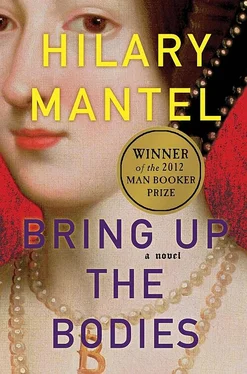‘Someone should take his verses to the printer,’ Wriothesley says. ‘That would fix them.’
‘He would not consent to that. They are private communications.’
‘If I were Wyatt,’ Call-Me says, ‘I would have made sure no one misconstrued me. I would have stayed away from Caesar’s wife.’
‘That is the wise course.’ He smiles. ‘But it is not for him. It is for people like you and me.’
When Wyatt writes, his lines fledge feathers, and unfolding this plumage they dive below their meaning and skim above it. They tell us that the rules of power and the rules of war are the same, the art is to deceive; and you will deceive, and be deceived in your turn, whether you are an ambassador or a suitor. Now, if a man’s subject is deception, you are deceived if you think you grasp his meaning. You close your hand as it flies away. A statute is written to entrap meaning, a poem to escape it. A quill, sharpened, can stir and rustle like the pinions of angels. Angels are messengers. They are creatures with a mind and a will. We do not know for a fact that their plumage is like the plumage of falcons, crows, peacocks. They hardly visit men nowadays. Though in Rome he knew a man, a turnspit in the papal kitchens, who had come face to face with an angel in a passage dripping with chill, in a sunken store room of the Vatican where cardinals never tread; and people bought him drinks to make him talk about it. He said the angel’s substance was heavy and smooth as marble, its expression distant and pitiless; its wings were carved from glass.
When the indictments come to his hand, he sees at once that, though the script is a clerk’s, the king has been at work. He can hear the king’s voice in every line: his outrage, jealousy, fear. It is not enough to say that she incited Norris to adultery with her in October 1533, nor Brereton in November the same year; Henry must imagine the ‘base conversations and kisses, touchings, gifts’. It is not enough to cite her conduct with Francis Weston, in May 1534, or to allege that she lay down for Mark Smeaton, a man of low degree, in April last year; it is necessary to speak of the lovers’ burning resentment of each other, of the queen’s furious jealousy of any other woman they look at. It is not enough to say that she sinned with her own brother: one must imagine the kisses, presents, jewels that passed between them, and how they looked when she was ‘alluring him with her tongue in the said George’s mouth, and the said George’s tongue in hers’. It is more like a conversation with Lady Rochford, or any other scandal-loving woman, than it is like a document one carries into court; but all the same, it has its merits, it makes a story, and it puts into the heads of those who will hear it certain pictures that will not easily be got out again. He says, ‘You must add at every point, and to every offence, “and several days before and after”. Or a similar phrase, that makes it clear the offences are numerous, perhaps more numerous than even the parties themselves recollect. For in that way,’ he says, ‘if there is specific denial of one date, one place, it will not be enough to injure the whole.’
And look what Anne has said! According to this paper, she has confessed, ‘she would never love the king in her heart’.
Never has. Does not now. And never could.
He frowns over the documents and then gives them out to be picked over. Objections are raised. Is Wyatt to be added? No, by no means. If he must be tried, he thinks, if the king goes so far, then he will be pulled away from this contaminated crew, and we will start again with a blank sheet; with this trial, with these defendants, there is no way but one, no exit, no direction except the scaffold.
And if there are discrepancies, visible to those who keep accounts of where the court resides on this day or that? He says, Brereton once told me he could be in two places at once. Come to think of it, so did Weston. Anne’s lovers are phantom gentlemen, flitting by night with adulterous intent. They come and go by night, unchallenged. They skim over the river like midges, flicker against the dark, their doublets sewn with diamonds. The moon sees them, peering from her hood of bone, and Thames water reflects them, glimmering like fish, like pearls.
His new allies, the Courtenays and the Pole family, profess themselves unsurprised by the charges against Anne. The woman is a heretic and so is her brother. Heretics, it is well known, have no natural limits, no constraints, fear neither the law of the land nor the law of God. They see what they want and they take it. And those who (foolishly) have tolerated heretics, out of laziness or pity, then discover at last what their true nature is.
Henry Tudor will learn harsh lessons from this, the old families say. Perhaps Rome will stretch out a hand to him in his trouble? Perhaps, if he creeps on his knees, then after Anne is dead the Pope will forgive him, and take him back?
And I? he asks. Oh, well, you, Cromwell…his new masters look at him with various expressions of bemusement or disgust. ‘I shall be your prodigal son,’ he says, smiling. ‘I shall be the sheep that was lost.’
At Whitehall, little huddles of men, muttering, drawn into tight circles, their elbows pointing backwards as hands caress the daggers at their waist. And among lawyers a subfusc agitation, conferences in corners.
Rafe asks him, could the king’s freedom be obtained, sir, with more economy of means? Less bloodshed?
Look, he says: once you have exhausted the process of negotiation and compromise, once you have fixed on the destruction of an enemy, that destruction must be swift and it must be perfect. Before you even glance in his direction, you should have his name on a warrant, the ports blocked, his wife and friends bought, his heir under your protection, his money in your strong room and his dog running to your whistle. Before he wakes in the morning, you should have the axe in your hand.
When he, Cromwell, arrives to see Thomas Wyatt in prison, the constable Kingston is anxious to assure him that his word has been obeyed, that Wyatt has been treated with all honour.
‘And the queen, how is she?’
‘Restless,’ Kingston says. He looks uneasy. ‘I am used to all sorts of prisoners, but I have never had one like this. One moment she says, I know I must die. Next moment, much contrary to that. She thinks the king will come in his barge and take her away. She thinks a mistake has been made, that there is a misapprehension. She thinks the King of France will intervene for her.’ The gaoler shakes his head.
He finds Thomas Wyatt playing dice against himself: the kind of time-wasting pursuit old Sir Henry Wyatt reprehends. ‘Who’s winning?’ he asks.
Wyatt looks up. ‘That trolling idiot, my worst self, plays that canting fool, my best self. You can guess who wins. Still, there is always the possibility it will come up different.’
‘Are you comfortable?’
‘In body or spirit?’
‘I only answer for bodies.’
‘Nothing makes you falter,’ Wyatt says. He says it with a reluctant admiration that is close to dread. But he, Cromwell, thinks, I did falter but no one knows it, reports have not gone abroad. Wyatt did not see me walk away from Weston’s interrogation. Wyatt did not see me when Anne laid her hand on my arm and asked me what I believed in my heart.
He rests his eyes on the prisoner, he takes his seat. He says softly, ‘I think I have been training all my years for this. I have served an apprenticeship to myself.’ His whole career has been an education in hypocrisy. Eyes that once skewered him now kindle with simulated regard. Hands that would like to knock his hat off now reach out to take his hand, sometimes in a crushing grip. He has spun his enemies to face him, to join him: as in a dance. He means to spin them away again, so they look down the long cold vista of their years: so they feel the wind, the wind of exposed places, that cuts to the bone: so they bed down in ruins, and wake up cold. He says to Wyatt, ‘Any information you give me I will note, but I give you my word that I will destroy it once this thing is accomplished.’
Читать дальше
Конец ознакомительного отрывка
Купить книгу












